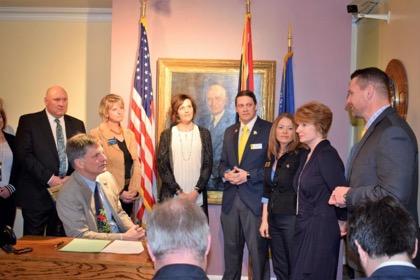
Laramie Community College President Joe Schaeffer thanks Governor Mark Gordon during a signing ceremony for Senate File 111.
The 2019 session of the Wyoming Legislature officially ended on Feb. 27, but came to a final close on Friday, March 15 when Governor Gordon took action on the last bills of the session. Wyoming’s business and economic development communities celebrated several victories during this year’s session, but also saw several prominent bills fail to advance. With that in mind, we offer a brief wrap-up of this year’s legislative session with a focus on the bills that received the most attention from those constituencies.
Senate File 111 – Community College Bachelor’s Degrees
As demonstrated by the crowd that attended the formal bill signing ceremony, many members of the business community consider this one of the most significant economic development bills to come out of the session. Sponsored by Laramie County Senator Tara Nethercott, the bill will allow community colleges to offer Bachelor of Applied Science degrees– bachelor’s degrees focused on career and technical education.
Wyoming Business Alliance President Cindy Delancey noted that the bill was the organization’s number one priority this session. Greater Cheyenne Chamber of Commerce President Dale Steenburgen noted the importance the bill would have for workforce development in the state.
“If we can get the right tools in the hands of our citizens, our future is unlimited,” Steenburgen said.
Laramie County Community College President Joe Schaeffer acknowledged the opposition the bill faced from University of Wyoming President Laurie Nichols in comments at the signing ceremony.
“We realize we have to continue to have a strong partnership with UW,” Schaeffer said. “This isn’t where the work ends.”
SF 122-Wyoming Works Program
This bill had an interesting route to the Governor’s desk. After the House narrowly defeated the bill, legislators were approached by supporters asking them to revive the bill. It was ultimately reconsidered and passed by the House and signed by the Governor. The bill allocates money from the state’s general fund to the Wyoming Community College Commission for the Wyoming Works! Program. This funding will allow the state’s community colleges to create technical education certificate programs that directly address local needs. The bill will provide access to higher education for nontraditional students who had previously been unable to access grants or loans for books or tuition.
Two other legislative wins for the business community were funding for expanded air service and a modification of the Hathaway scholarship program. The governor’s supplemental budget bill included $15 million for Commercial Air Service improvement in the state. Business leaders and the ENDOW Executive Council have viewed improving air service as critical to the state’s ability to attract new business and expand and retain existing businesses as economic diversification efforts continue.
Senate File 43 modified the Hathaway scholarship program to make it easier for students interested in fine arts and career and technical education to meet the Scholarship’s eligibility requirements. Currently, students must take two years of a foreign language and two years of either fine arts, career and technical education, or additional foreign language. The new guidelines allow students to take four years of either foreign language, CTE or fine arts courses. The change was welcomed by State Superintendent of Public Instruction Jillian Barlow.
“With this bill, we can help deliver the skilled workforce that Wyoming industries need, no matter if that’s a four-year degree or specialized training,” she said in a Wyoming Department of Education release.
On the flip side, despite early calls for fiscal sustainability from legislative leaders, little progress was made in diversifying the revenue side of Wyoming’s budget picture. A 3% statewide lodging tax that would have provided a steady funding stream to the Wyoming Office of Tourism died in the Senate after passing overwhelmingly in the House. The tax was supported by the Wyoming Lodging and Restaurant Association and the Wyoming Travel Industry Coalition.
House Bill 220, titled the “National Retail Fairness Act” would have created a corporate income tax that targeted big box stores and corporations with more than 100 shareholders. It passed the House but Senators never took a vote on the tax and it saw strong opposition from state retail, lodging, and restaurant associations. It would have raised an estimated $45 million a year for public schools.
Finally, a bill that would have authorized municipalities to create community development districts through specific assessments passed the Senate but died in the House. The bill would have given landowners in a defined area the ability to vote on assessments to fund services not currently being provided by municipal government. Senator Nethercott noted that the bill was requested by developers and private businesses for the need to provide necessary infrastructure that municipalities cannot provide. Cheyenne Mayor Marion Orr was a strong supporter of the bill, which passed the Senate but died in the House.
Finally, in a press conference last week, Governor Gordon said that he would like to use the ENDOW council to compare Wyoming’s tax structure with “peer” states, allowing residents to see more clearly what happens to state services when energy prices fluctuate.
“That way, I think the people of Wyoming will be well-informed about what these struggles are really going to mean for the future,” Gordon said. “This gives us the opportunity to be realistic and mature about what our state’s needs are going to be going forward under different revenue scenarios.”

